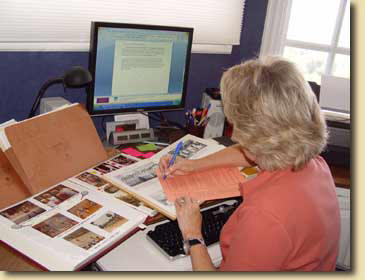|
GETTING STARTED
If you’re like some of my students, you may wonder if you
can remember enough of your life to write a meaningful story
about it. There may be vast stretches of time you can’t
account for. For some of us, after we finished school and
settled down with a family, whole decades seemed to fly by
in a blur.
Actually, retrieving memories is not as difficult as it may
seem. 
Suggestions:
· Browse through old photo albums. Notice the
friends you played with, the vacations you took, the houses
you lived in, the furniture in the background, the clothes
you wore, the way you wore your hair, the cars you drove,
the pets you owned. Jot down memories that come to you.
· Look through school annuals. Note the clubs
you belonged to, the sports you played, the dances you
attended, the friends and teachers who were important in
your life. Read the notes your friends wrote to you on the
end pages.
· Rummage through old memory books, scrapbooks,
keepsake boxes.
· Call your siblings and other relatives and
reminisce about the past. You’ll probably find you don’t
remember the same incidents in quite the same way.
· Visit homes where you lived, schools you
attended, cemeteries where loved ones are buried, and other
locales meaningful in your life. Sit in front of these
places for a while and write down memories that occur to
you.
· Make lists about yourself: the cars, homes,
and pets you owned, the schools you attended, your favorite
books, movies, songs, foods, etc. List the major turning
points in your life.
· Draw a floor plan of your childhood home.
· Create a chronology of your life. Make a
chart with two columns. In one column list events and
incidents from your life. In the second column assign a date
to the event, however approximate. Make a note of which
incidents you definitely want to include in your life story.
____________
Choose a Format
It can be confusing. You have all kinds of
memories floating around in your head, memories you want to
preserve for your descendants in some kind of written
format. What format should you choose? Autobiography?
Memoir? A collection of assorted stories? A hand-written,
six-page life summary that you stuff in an envelope
alongside your will? What works best for you?
Determining
the focus and scope of your life story may be the hardest
decision you make, one that can keep your good intentions
forever simmering on the back burner. Before you fade at the
starting gate, let’s look at your options:
-
Autobiography
Most of us
are familiar with the format. You may have hand-written a
ten-pager in grade school that began with something like “I
was born on June 19, 1944, in Concord, Massachusetts, and
ended on page ten with “Now I am twelve years old and a
sixth grader at Ford Avenue Elementary School.” Essentially,
that’s the autobiographical format---a chronological
narrative that traces the life course of the author from
birth to the time of authorship. As the autobiographer, you
get to pick and choose what incidents you want to include
and how you want to organize your presentation.
One option to consider is a combination of
both methods, a chronological-topical format. With this
approach, you organize your life into five or six time
segments (childhood, adolescence, young adulthood, middle
years, golden years, etc.), and then discuss the major
events that occurred during those time periods by topics,
which you identify by chapter subheadings (schooling,
friends, jobs, family, and vacations).
-
Memoir
Most
published life stories on bookstore shelves are memoirs
rather than autobiographies. A memoir generally recounts
only a small portion of the author’s life—her childhood, for
example. In some cases, the writer carefully chooses
specific incidents, impressions, and memories that
contribute to her overall purpose, which may be literary,
thematic, or something else. Memories tend to be artfully
arranged, with more emphasis on style than allegiance to
fact and history. Frequently, a memoir is shaped by a
particular theme, such as political involvement, religious
or career experiences, or overcoming adversity. See
Writer’s Toolbox for a list of
memoirs that will show you how the pros do it.
-
A Collection of Stories
Maybe you’d
just like to write down a series of incidents that relate to
one specific aspect of your life, such as a group of stories
about your family vacations or holiday celebrations. Or,
perhaps you'd like to write an anthology of stories dealing
with career experiences or faith-promoting incidents. The
advantage of this format is that each story can stand alone,
as a separate chapter. You needn't worry about tying
everything together or making incidents fit chronologically.
____________
I Advise
Pick a
manageable project, one that you will enjoy writing and one
that fits within your time constraints. If you consider
yourself a novice at this, don’t tackle a multi-generation
history of your family. You’ll soon find yourself in over
your head, likely to give up in despair.
No matter
what your format, your life story should let your readers
understand who you are and how you lived. You
need to be in your story—not just your experiences, but your
feelings about them. What a shame to go to the effort
required to write your life story merely to end up with a
recitation of events that fails to reveal your heart and
soul—the inner you.
|
|







